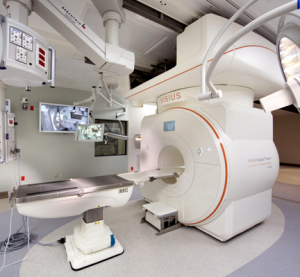by
Gus Iversen, Editor in Chief | January 21, 2015

VISIUS Hybrid OR from IMRIS
Add Sahlgrenska University Hospital in Sweden to the list of neuroscience facilities with cutting edge intraoperative MRI (iMRI) capabilities. IMRIS has announced today that they have been hired, in partnership with Siemens Healthcare, to integrate a VISIUS Surgical Theatre among four hybrid operating suites.
"The relationship with Siemens keeps getting closer and closer for a couple of reasons," Jay Miller, CEO of IMRIS, told DOTmed News. "One is that the hybrid OR market is starting to blossom." The symbiosis between the two companies essentially depends on Siemens thriving in the imaging aspect of the hybrid OR while IMRIS expertly handles operating room solutions, training neurosurgeons, and understanding workflow for spine and neurosurgery, explained Miller.
"The unique things about the Sahlgrenska deal are: one, it's an extremely globally prestigious hospital and arguably the most important hospital in Sweden and, two, Siemens took the purchase order and will in turn give us a purchase order," said Miller.



Ad Statistics
Times Displayed: 45553
Times Visited: 1363 MIT labs, experts in Multi-Vendor component level repair of: MRI Coils, RF amplifiers, Gradient Amplifiers Contrast Media Injectors. System repairs, sub-assembly repairs, component level repairs, refurbish/calibrate. info@mitlabsusa.com/+1 (305) 470-8013
In most of their previous partnerships, that had been the other way around. Miller attributes the reversal to Siemens' involvement in the deal, in which the hybrid ORs are only one part of the picture.
The benefits of a hybrid OR are in knowing the surgical progress before finalizing the procedure. Being able to perform an MR on the brain, for instance, before sewing the patient up, can potentially yield unremoved tumor and prevent an entire secondary procedure. A second procedure can cost $50,000 to $75,000, said Miller, so eliminating the need for it means better outcomes for the patient as well as meaningful savings.
Without a hybrid OR, the only way to obtain those images mid-procedure is to wheel the sedated surgery patient over to the imaging system. That's a very delicate process and may require participation from several staff members.
"The prognosis for stage one pediatric brain tumors is extremely good if they can get 100 percent of the tumor the first time," said Miller. "If they get 95 percent the prognosis is dramatically worse."
Miller says that just as every market internationally is unique, every transaction IMRIS is involved in is also unique. The company has worked with several U.S. hospitals including Johns Hopkins, Washington University, The Cleveland Clinic, and the Mayo Clinic. He said all of these academic centers, including Sahlgrenska University Hospital, have one thing in common.
"They all recognize that having iMRI to do clinical cases and perform research is strategically important for staying on the cutting edge of neurosurgery in the long-term," said Miller.
Back to HCB News

